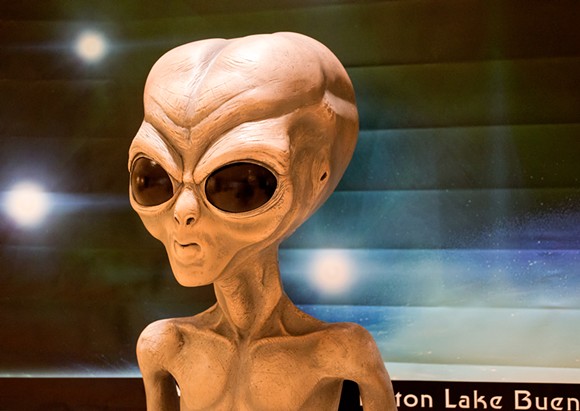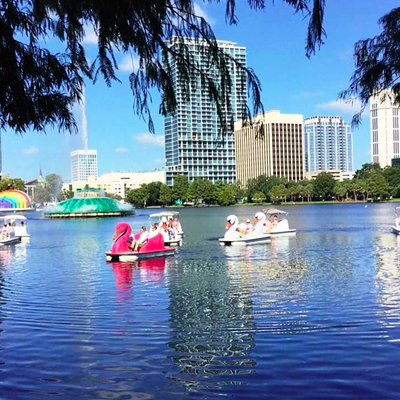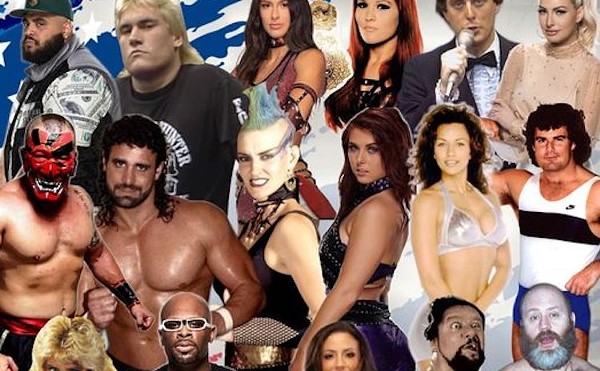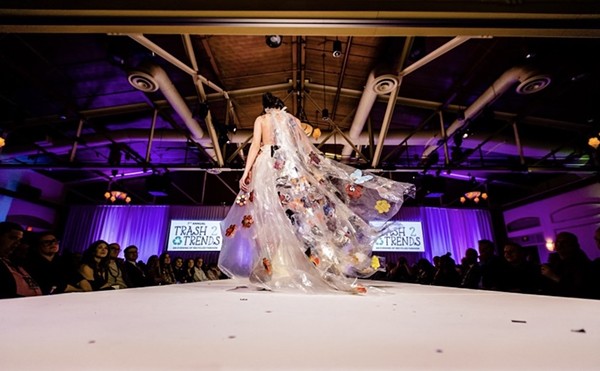Here's what it's like to be a UFO investigator in Florida
By Monivette Cordeiro on Mon, Aug 29, 2016 at 1:56 pm
Hundreds of people descended into Lake Buena Vista last weekend to talk aliens at a symposium for the Mutual UFO Network (MUFON), an organization that scientifically investigates and collects data on UFO sightings and other phenomena.
While some people scoff at the notion of otherworldly beings, many are interested and they're not all wearing tin foil hats or running weird shows on the History Channel.
Orlando Weekly talked to Morgan Beall, the Florida state director for MUFON, about the kinds of things he sees when he's investigating the weird parts of the Sunshine State that don't involve the Florida man.
OW: Does Orlando have a high propensity for UFOs?
Beall: Orlando, along with the rest of Florida, has actually had quite a few sightings compared to other states. On average we get about 30 to 40 cases a month from Florida alone. We get combination cases of someone seeing a strange object and then possibly something unexplainable, like the abduction phenomenon people talk about or something crawling around or walking around on the ground that’s associated with the flying objects. Do we know what those are? Are they aliens or not? We don’t know. We just know there’s a phenomenon that we’re trying to scientifically study. Mainly, it's objects in the sky we can’t explain.
OW: Why do you think Florida is such a hotspot for those sightings?
Beall: The water is a good reason. Florida, as you know, has one of the longest coastlines of any state in the U.S. There’s a lot of open skies, and people go outside a lot. We’re a tourist destination for the rest of the country, so a lot of people tend to gravitate to our beaches, which translates to higher counts of cases.
OW: What has been an interesting case you’ve heard of this year?
Beall: This is a Canadian case, but it was worked on by our stateside investigators. An engineer who runs an engineering company was on a hunting trip along with his colleagues when they saw something very close, a like a metallic-type object, that interfered with their hunting equipment. Their camera systems were shutting down. They saw this object up close, within a few 100 feet. It was definitely not a conventional aircraft of any kind because it didn’t have any physical propulsion or propeller or anything. That's something we would classify as a Unidentified Aerial Phenomena (UAP).
OW: What about in Florida?
Beall: One of the most interesting things we received this year are some historical pieces from military bases. I worked on a case this past year that dealt with some Navy witnesses. This incident happened on the USS Independence over the Atlantic Ocean off the coast of Florida where they saw a light underneath the ship, and remember this is a large aircraft carrier. A witness described like this: If you put a paperclip in your hand, the USS Independence would be the paperclip and your hand would be the light. Eventually the light went to the front of the ship and pulled out of the water and shot off until it disappeared into the sky. It was impressive to hear this coming from military personnel. Another very interesting case off the coast of Florida involved the U.S. Coast Guard. They saw a small, silver disc come out of the water near their ship and pick up their buoy, which they were dragging behind the ship. Another famous case is from 1989 at the Miami International Airport. Two flights nearly collided with this boomerang-shaped aircraft hovering over the tarmac and all the ground personnel, the traffic operators, pilots and all these witnesses never talked about because the tower manager told everybody to keep their mouths shut. We found two witnesses that eventually came and talked to us: A radio operator who heard the whole incident happen over the radio and a tower operator who had second-hand counsel on the incident.
OW: What’s it like an investigator?
Beall: Well, it’s certainly not glamorous. And it’s a lot of work. Depending on the research you’re doing, you could be doing historical document research and archives, which is arduous and academic. You could be part of the analysis teams that look and extrapolate data. A few of us do actual interviews and look at the trace evidence, following up on leads. There’s a lot of different roles in the organization. We’re all volunteers. I do this on my time off. I have a day job, and then I have this job.
OW: What do you hear from people? Do you get hate online?
Beall: Oh, of course. I mean, you have people that like the phenomena, and they're interested in it, but are constantly trolling other individuals online just because they think it’s funny. It’s OK to be skeptical, actually. We encourage it. We want people to ask questions, we want them to test the hypothesis, but there are people we call pseudo skeptics or cynics who don’t want to believe. I think belief is the wrong word because it’s not so much about believing. We try to question everything, look at all the facts and then we learn from it at the the end.
While some people scoff at the notion of otherworldly beings, many are interested and they're not all wearing tin foil hats or running weird shows on the History Channel.
Orlando Weekly talked to Morgan Beall, the Florida state director for MUFON, about the kinds of things he sees when he's investigating the weird parts of the Sunshine State that don't involve the Florida man.
OW: Does Orlando have a high propensity for UFOs?
Beall: Orlando, along with the rest of Florida, has actually had quite a few sightings compared to other states. On average we get about 30 to 40 cases a month from Florida alone. We get combination cases of someone seeing a strange object and then possibly something unexplainable, like the abduction phenomenon people talk about or something crawling around or walking around on the ground that’s associated with the flying objects. Do we know what those are? Are they aliens or not? We don’t know. We just know there’s a phenomenon that we’re trying to scientifically study. Mainly, it's objects in the sky we can’t explain.
OW: Why do you think Florida is such a hotspot for those sightings?
Beall: The water is a good reason. Florida, as you know, has one of the longest coastlines of any state in the U.S. There’s a lot of open skies, and people go outside a lot. We’re a tourist destination for the rest of the country, so a lot of people tend to gravitate to our beaches, which translates to higher counts of cases.
OW: What has been an interesting case you’ve heard of this year?
Beall: This is a Canadian case, but it was worked on by our stateside investigators. An engineer who runs an engineering company was on a hunting trip along with his colleagues when they saw something very close, a like a metallic-type object, that interfered with their hunting equipment. Their camera systems were shutting down. They saw this object up close, within a few 100 feet. It was definitely not a conventional aircraft of any kind because it didn’t have any physical propulsion or propeller or anything. That's something we would classify as a Unidentified Aerial Phenomena (UAP).
OW: What about in Florida?
Beall: One of the most interesting things we received this year are some historical pieces from military bases. I worked on a case this past year that dealt with some Navy witnesses. This incident happened on the USS Independence over the Atlantic Ocean off the coast of Florida where they saw a light underneath the ship, and remember this is a large aircraft carrier. A witness described like this: If you put a paperclip in your hand, the USS Independence would be the paperclip and your hand would be the light. Eventually the light went to the front of the ship and pulled out of the water and shot off until it disappeared into the sky. It was impressive to hear this coming from military personnel. Another very interesting case off the coast of Florida involved the U.S. Coast Guard. They saw a small, silver disc come out of the water near their ship and pick up their buoy, which they were dragging behind the ship. Another famous case is from 1989 at the Miami International Airport. Two flights nearly collided with this boomerang-shaped aircraft hovering over the tarmac and all the ground personnel, the traffic operators, pilots and all these witnesses never talked about because the tower manager told everybody to keep their mouths shut. We found two witnesses that eventually came and talked to us: A radio operator who heard the whole incident happen over the radio and a tower operator who had second-hand counsel on the incident.
OW: What’s it like an investigator?
Beall: Well, it’s certainly not glamorous. And it’s a lot of work. Depending on the research you’re doing, you could be doing historical document research and archives, which is arduous and academic. You could be part of the analysis teams that look and extrapolate data. A few of us do actual interviews and look at the trace evidence, following up on leads. There’s a lot of different roles in the organization. We’re all volunteers. I do this on my time off. I have a day job, and then I have this job.
OW: What do you hear from people? Do you get hate online?
Beall: Oh, of course. I mean, you have people that like the phenomena, and they're interested in it, but are constantly trolling other individuals online just because they think it’s funny. It’s OK to be skeptical, actually. We encourage it. We want people to ask questions, we want them to test the hypothesis, but there are people we call pseudo skeptics or cynics who don’t want to believe. I think belief is the wrong word because it’s not so much about believing. We try to question everything, look at all the facts and then we learn from it at the the end.
Tags:

WE LOVE OUR READERS!
Since 1990, Orlando Weekly has served as the free, independent voice of Orlando, and we want to keep it that way.
Becoming an Orlando Weekly Supporter for as little as $5 a month allows us to continue offering readers access to our coverage of local news, food, nightlife, events, and culture with no paywalls.
About The Author
Scroll to read more Arts Stories + Interviews articles
Newsletters
Join Orlando Weekly Newsletters
Subscribe now to get the latest news delivered right to your inbox.















